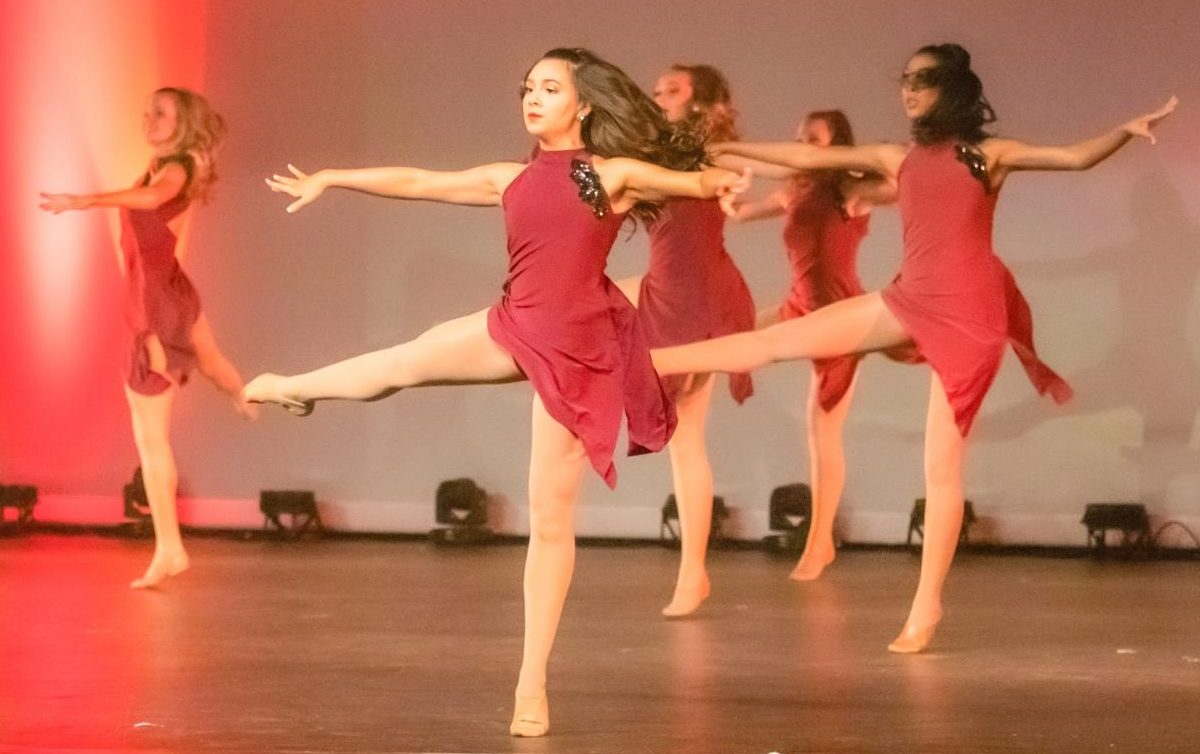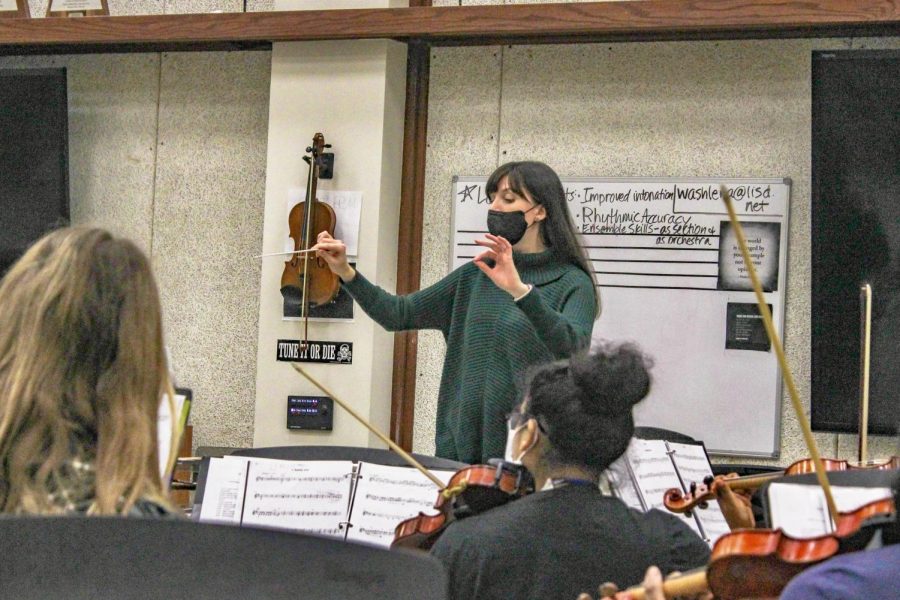
Editor’s note: This story was named a superior feature story in the 2021 TAJE Best of Texas contest. It also won first place feature story in the Press Women of Texas high school journalism contest before going on to win first place in the same category in the National Federation of Press Women contest.
Pure anger coursed through senior Tristan Finn’s veins as she pushed through her solo for the fifth time. She was 14, too sick to stand up straight, but she had to keep dancing. She was being punished for missing the dress rehearsal two days prior due to her chronic illness.
Her technique had to be perfect. She had to be strong and graceful. She had to smile and convey emotions, but all she could think about was her agonizing pain and her coaches’ apathy.
“The worst part is that I couldn’t just not do it,” Tristan said. “I was literally being forced to.”
• • •
When Tristan was in preschool, her mother, Jeanne Finn, chose to put her in dance classes. Jeanne said that Tristan loved dancing around the house since she was a baby, and performed as a bunny in her kindergarten Nutcracker.
“Every single fall, she would bust out the CD of The Nutcracker,” Jeanne said. “And she would just dance and dance and dance in the foyer.”
Tristan said that in the beginning she loved and looked forward to practicing and honing her skills as a dancer.
When Tristan advanced to the senior company during seventh grade, she said the directors’ attitudes changed. She got sick and missed a one hour practice, which resulted in her having to split her role with another dancer. Tristan performed her dance in one show while the other dancer took her place in the other two.
“It was kind of a stab in the back,” Tristan said. “It’s not something you can control and it’s not like it was an injury where I was going to be out for weeks or months. It was something that would be 48 to 72 hours.”
Tristan said the coaches expected the young dancers to perform as if ballet was their profession, which created a toxic environment in the studio.
“They were treating us like professionals when we were still students and kids,” Tristan said. “I think that was just hard for a lot of us to grasp because we are so young. We’re not going to be perfect.”
According to Tristan, the dancers were injured often but some of the coaches were completely indifferent. Dancers were frequently pressured to continue practicing and to hurt themselves further for the good of the studio.
Tristan said that even the nicer coaches would turn a blind eye to this when dancers told them what was happening.
One dancer with a knee injury was forced to take off her brace because it made it difficult for the coaches to judge her technique. She had to dance full-out for hours, ultimately causing more knee damage.
“It was kind of like they didn’t care about us as long as the end result made them look good,” Tristan said.
Tristan experienced health problems from the pressure. Starting in middle school, she suffered from a chronic stomach illness called cyclic vomiting syndrome. It caused her severe nausea, vomiting and difficulty eating brought on by her intensive physical exertion and lack of sleep. After the initial wave of pain, she still felt intense pressure and tightness in her stomach that kept her from standing upright. After dancing for upwards of five hours each day, she was too exhausted to even eat dinner, which made her illness worse.
According to Jeanne, Tristan lost almost 10 pounds in just six months, which raised some concerns at her yearly checkup because eating disorders are so prevalent among dancers.
“I didn’t look healthy. I didn’t feel healthy,” Tristan said.
Despite being visibly ill with discolored skin, Jeanne said her coaches looked the other way, according to Jeanne. They didn’t allow her to recover after episodes of her illness and still made her dance when she had the flu.
“Her director point blank asked her ‘Why are you sick all the time? I think you’re fine to stay,’” Jeanne said. “Her director went on so far to say that I could pick her up and she could leave the studio but she needed to return for rehearsal to observe.”
Instead, they forced her to run her solos back to back five times each. She said she didn’t feel well enough to exert this much energy before a competition.
“I was puking in the bathroom and they were telling me I was fine,” Tristan said. “It wore me down for the rest of the week instead of giving me time to recover. By the time I got to the competition on Friday, I didn’t do well. I didn’t place at all.”
Tristan said that the dancers were made to feel guilty for their illnesses and injuries. The coaches implied that their pain was their fault as well as a major inconvenience. Tristan and other dancers were shamed for getting hurt or sick and made to feel like their team would do badly at a competition because of them.
“The things they would say to you would be so degrading that it brought your whole morale down,” Tristan said.
• • •
Junior Marquette McKenna Sadlowski attended the same studio. McKenna said the studio was serious about technique but criticized girls’ bodies, sometimes not considering them for roles solely because of their appearance.
“I would say that the teachers there were very negative about your body image and how you looked,” McKenna said. “They definitely had favoritism and pushed you so hard that you would go home crying every night.”
Tristan was regularly expected to dance for five hours on school nights, while McKenna often danced for up to seven. This made it difficult for the middle schoolers to finish their homework.
“I wouldn’t leave until 10 or 10:15 every night,” McKenna said. “I would stay up until 3 or 4 in the morning trying to get it all done and then I would have to go back to school and do it all again the next day.”
• • •
According to Tristan, most of the dancers didn’t stay with the studio because they enjoyed it, but because they had spent so many years there and felt loyal.
“No one was happy,” Tristan said. “We would just spend hours and hours complaining about our ballet teachers and how sick and tired we were. The seniors couldn’t wait to get out of it.”
Tristan’s mom said that after graduation seniors rarely came back to visit, which she now believes may have been a red flag.
“Once they graduated, they were gone,” Jeanne said. “You never really saw them.”
Jeanne considered looking for another studio a few times, but she didn’t want to believe that anything bad was going on and Tristan wasn’t ready to leave.
• • •
After eighth grade, Tristan decided that she had enough. She found herself crying every day, dreading dance. Her parents and doctors were concerned for her health. Something had to change.
She originally never thought she would be a drill team dancer because she had such a long history in ballet, but after her time at the studio, Tristan heard
about directors Alice Dack and Shelby Hladky. People told her about the empathy and patience they have for their dancers.

“I was sick and tired of such a negative environment,” Tristan said. “I wanted people who genuinely cared about me and wanted to see me succeed.”
Tristan auditioned for the Marquettes her freshman year. She said that she faced harsh judgement from her dance teachers and peers who viewed the drill team as a waste of time.
In the end, Tristan found that the Marquettes were the perfect fit. Tristan has been with the drill team for almost four years and is now the Marquettes captain. Since joining the Marquettes, she no longer suffers from her illness. According to her mom, the transition from the toxic studio environment to the positive environment of Marquettes made Tristan a new, happier person.
“She did it, she made it,” Jeanne said. “And we’re really proud of her for that.”
Dack explained that she has heard a lot about talented dancers who are pressured too hard and ultimately lose interest in the sport they dedicated their lives to. She said that as a coach she does everything she can to counteract this.
“I always try to follow something negative with a positive,” Dack said.
Dack said that Tristan’s past experience has shown Tristan that it is possible to make progress and see positive results without being a negative person.
“Just watching her as captain this year and really stepping into that role, it’s ‘What can I do to make our team better? What can I do to make this a better situation?’” Dack said. “She’s very much about making everything a better experience for those around her.”
Tristan said that since joining the Marquettes her freshman year, she has found her love for dance again.
“I look forward to going to Marquettes every day and seeing the people and seeing Dack and Hladky,” Tristan said. “They just make me happier.”














